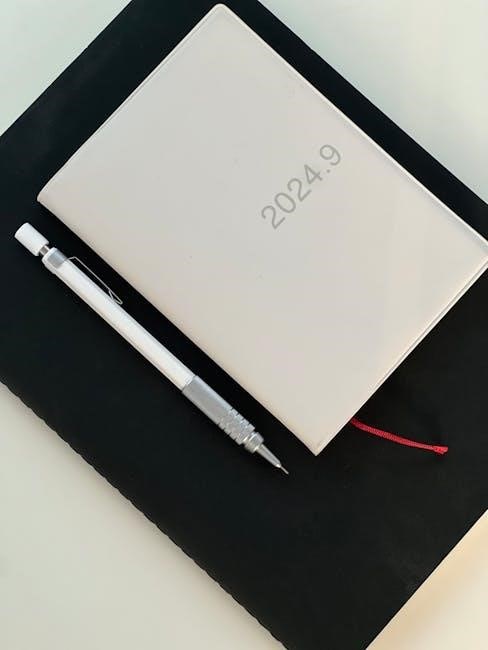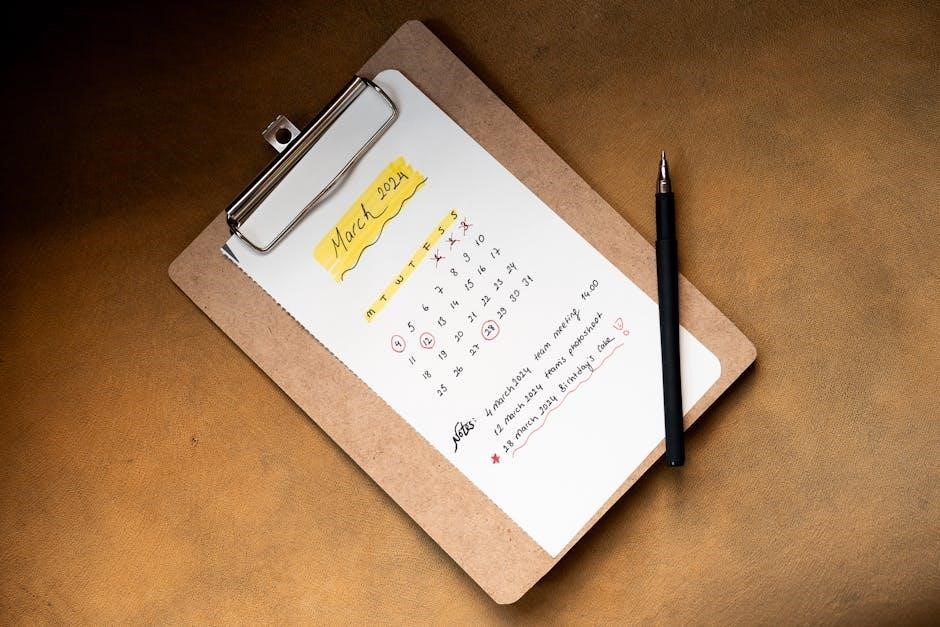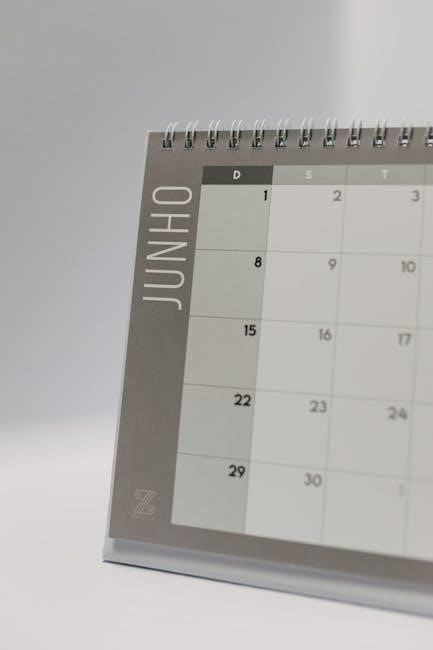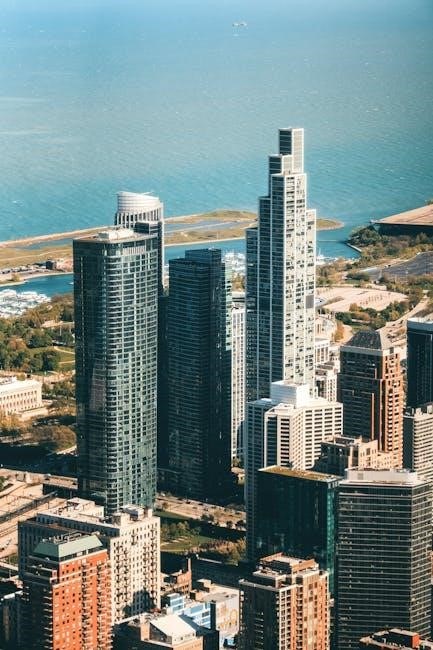
The 2024 Chicago Recycling Schedule outlines the city’s Blue Cart program, offering bi-weekly pickups for residents. This initiative aims to promote sustainability and efficient waste management.
Residents can access detailed calendars, zone-based pickup dates, and holiday adjustments online. The program emphasizes proper waste sorting and community participation for a greener Chicago.
Overview of the Blue Cart Recycling Program
The Blue Cart Recycling Program is Chicago’s primary residential recycling initiative, providing bi-weekly collection services for single-family homes and small multi-unit buildings. Residents can recycle materials like plastics, papers, glass, and metals. The program emphasizes proper sorting to ensure efficiency and environmental impact. By participating, residents contribute to the city’s sustainability goals and help reduce landfill waste effectively.
Importance of Recycling in Chicago
Recycling plays a vital role in reducing landfill waste and promoting sustainability in Chicago. By participating in the Blue Cart program, residents help conserve natural resources, decrease greenhouse gas emissions, and support the city’s environmental goals. Proper recycling practices contribute to a cleaner, healthier community and foster a culture of eco-consciousness for future generations.

Key Features of the 2024 Recycling Schedule
The 2024 schedule includes bi-weekly pickups, holiday adjustments, and a zone-based collection system to streamline recycling services for Chicago residents efficiently.
Bi-Weekly Pickup Frequency
The 2024 Chicago Recycling Schedule features bi-weekly pickup services for residents, ensuring consistent waste management. Each collection zone follows a specific rotation, with pickups occurring every other week. This frequency allows residents to plan accordingly, ensuring materials are ready on their designated days. The program aims to maintain efficiency while encouraging participation in the city’s recycling initiatives, supporting a cleaner and more sustainable environment for all Chicagoans.
Holiday Collection Schedule Adjustments
Holidays can affect Chicago’s recycling schedule, with pickup dates adjusted on select days. Residents should check the official 2024 calendar for specific changes. Major holidays like New Year’s Day and Thanksgiving may delay collections by one day. The city ensures minimal disruption, but advance planning is crucial for timely waste management during these periods.
Zone-Based Collection System
Chicago’s 2024 recycling schedule operates on a zone-based system, dividing the city into distinct areas. Each zone has a specific pickup schedule, ensuring efficient collection. Residents can identify their zone using the Blue Cart Residential Recycling Map, which also provides hauler details and dates. This system streamlines operations, making it easier for residents to stay informed about their recycling pickup times.

How to Use the 2024 Recycling Schedule
Access the 2024 schedule online, identify your collection zone, and use digital tools like apps and maps to track pickup dates and stay informed.
Identifying Your Collection Zone
Residents can determine their collection zone using the Blue Cart Residential Recycling Map on the City of Chicago’s website. Each zone has designated pickup dates, ensuring efficient scheduling. By entering your address, you can confirm your zone and access specific dates. This system helps residents stay updated on their recycling pickup times and plan accordingly for proper waste management.
Accessing the Schedule Online
Residents can easily access the 2024 Chicago Recycling Schedule online via the City’s official website. The site provides interactive maps, zone-specific calendars, and downloadable PDFs. By visiting chicago.gov, users can enter their address to view personalized pickup dates, ensuring they never miss a collection day. This digital tool enhances convenience and encourages participation in the recycling program.
Understanding Pickup Zones and Haulers
Chicago’s recycling program divides the city into distinct pickup zones, each serviced by designated haulers. Residents can determine their zone and assigned hauler using the city’s online tools or maps. This system ensures efficient collection and helps residents track their specific pickup days. For example, zones may be serviced by companies like Republic Services or other authorized providers.
By understanding your zone and hauler, you can better navigate the recycling schedule and ensure materials are collected on the correct dates. Visit the City of Chicago’s recycling page for detailed zone maps and hauler information tailored to your location.
Holiday Impact on Recycling Schedule 2024
Major holidays like New Year’s Day, Memorial Day, and Thanksgiving alter Chicago’s recycling pickup dates, with collections often skipped or rescheduled to the following day.
Major Holidays Affecting Collection
Major holidays like New Year’s Day, Memorial Day, Independence Day, Labor Day, Thanksgiving, and Christmas impact Chicago’s recycling schedule. Collections are typically delayed by one day if the holiday falls on a weekday. Residents should check the city’s official calendar for specific adjustments, as some holidays may result in no collection or rescheduling to the following day.
Special Instructions for Holiday Weeks
During holiday weeks, residents should confirm their adjusted pickup dates online or via the city’s mobile app. Ensure all materials are properly sorted and placed curbside by 6 AM on the rescheduled day. Note that some holidays may cause collections to shift by one or two days, so checking the official schedule is essential for uninterrupted service.

Chicago Recycling Zones and Maps
Chicago is divided into three main recycling zones: North, South, and West. Each zone has specific pickup schedules and service providers, detailed in the 2024 map guide.
Zone 1: North Side
Zone 1 covers Chicago’s North Side, including neighborhoods like Lincoln Park and Lakeview. Recycling pickup occurs every two weeks, with specific dates outlined in the 2024 schedule. Residents can use the city’s interactive map to confirm their collection days and ensure materials are properly sorted for efficient processing. This zone is serviced by designated haulers to maintain timely collections.
Zone 2: South Side
Zone 2 encompasses Chicago’s South Side, including areas like Hyde Park and South Shore. Recycling collection follows a bi-weekly schedule, with dates specified in the 2024 calendar. Residents can access the city’s online resources to verify their pickup days and ensure compliance with guidelines. This zone is managed by assigned waste haulers to maintain consistent service.
Zone 3: West Side
Zone 3 covers Chicago’s West Side, including neighborhoods like Austin and Belmont Cragin. Recycling pickup occurs every two weeks, with dates outlined in the 2024 schedule. Residents can use the city’s interactive map to confirm their collection days and ensure materials are properly prepared. This zone operates under the Blue Cart program, emphasizing efficient waste management and community participation.

Accepted Materials for Recycling
Chicago’s recycling program accepts plastics, papers, glass, and metals. Items include bottles, cans, cardboard, and jars. Broken glass and non-recyclable plastics are excluded.
Plastics, Papers, and Glass
Chicago’s recycling program accepts common plastics like bottles and containers, mixed papers, and glass items. Residents can recycle plastic bottles, jars, cardboard, and newspaper. Glass bottles and jars are also included. Ensure items are clean and sorted properly. Avoid broken glass or non-recyclable plastics like plastic bags or foam.
Metals and Electronics
Metal cans, such as aluminum and steel, are recyclable in Chicago’s Blue Cart program. Electronics, including computers and small appliances, are accepted at designated drop-off centers. Residents should ensure metals are clean and electronics are prepared according to city guidelines. Visit the city’s website for specific instructions and locations to properly recycle these items.
Yard Waste and Special Collections
Yard waste, like leaves and branches, is collected seasonally in Chicago. Residents must bundle branches or place yard waste in designated bags. Special collections for bulk items and household hazardous waste are also available. Check the 2024 schedule for specific dates and drop-off locations to ensure proper disposal and recycling of these materials.
Chicago Recycling Drop-Off Centers
Chicago offers convenient drop-off centers for recycling, including locations like 10455 S. Ridgeland Ave. These centers accept yard waste, bulk items, and special materials, operating Monday-Friday from 8:30 AM to 5 PM.
Locations and Hours of Operation
Chicago’s recycling drop-off centers, such as the one at 10455 S. Ridgeland Ave, operate Monday-Friday from 8:30 AM to 5 PM. These centers provide convenient access for residents to recycle yard waste, bulk items, and special materials, supporting the city’s sustainability goals.
Types of Materials Accepted
Chicago’s drop-off centers accept a variety of materials, including plastics, glass, paper, and metals. Yard waste, electronics, and bulk items are also permitted, but hazardous waste and construction debris are excluded. Proper sorting ensures efficient recycling and supports the city’s environmental initiatives.
Digital Tools for Recycling Scheduling
Chicago offers mobile apps, interactive maps, and email/text notifications to help residents track their recycling schedules. These tools provide real-time updates and pickup reminders for efficient planning.
Mobile Apps for Pickup Reminders
Chicago residents can download mobile apps like the Chicago Recycling Guide or Waste Management to receive pickup reminders. These apps provide real-time notifications, collection schedules, and zone-specific updates. Users can input their addresses to track recycling and trash pickup dates, ensuring they never miss a collection day. The apps also offer educational resources on proper waste sorting and recycling guidelines.
Interactive Maps and Calendars
The City of Chicago offers interactive maps and calendars to help residents track their recycling schedules. These tools allow users to input their addresses and view collection dates for their specific zone. The interactive maps also outline pickup zones and haulers, while calendars provide a visual breakdown of recycling and trash collection dates throughout 2024. Users can download or print these resources for easy reference.
Text and Email Notifications
Residents can receive text or email notifications for recycling pickup reminders. By signing up through the city’s website, users get alerts about collection dates, holiday schedule changes, and special collections. These notifications ensure residents stay informed and never miss a pickup, promoting consistent participation in the recycling program and helping Chicago achieve its sustainability goals.
Chicago’s recycling program promotes sustainability and community involvement. Proper waste sorting and consistent participation are key to its success, benefiting both residents and the environment.
Sort materials correctly, stay informed via digital tools, and encourage neighbors to join. Together, Chicago can achieve its eco-friendly goals and maintain a cleaner, greener city.
Best Practices for Sorting Waste
Ensure materials are clean and sorted correctly to avoid contamination. Remove lids, labels, and residue from containers. Keep plastics, papers, and glass separate. Avoid mixing recyclables with trash or hazardous items. Use designated bins for electronics and batteries. Stay informed about acceptable materials to maximize recycling efficiency and support Chicago’s sustainability goals.
Community Involvement in Recycling
Active community participation is vital for Chicago’s recycling success. Residents are encouraged to engage through local initiatives, educational workshops, and neighborhood clean-up events. Schools and organizations often partner with the city to promote recycling awareness. By fostering a collective commitment, Chicago aims to create a more sustainable environment for future generations while empowering residents to take an active role in waste management.
